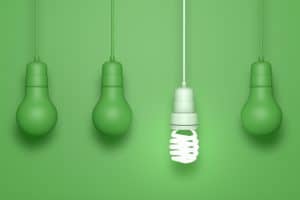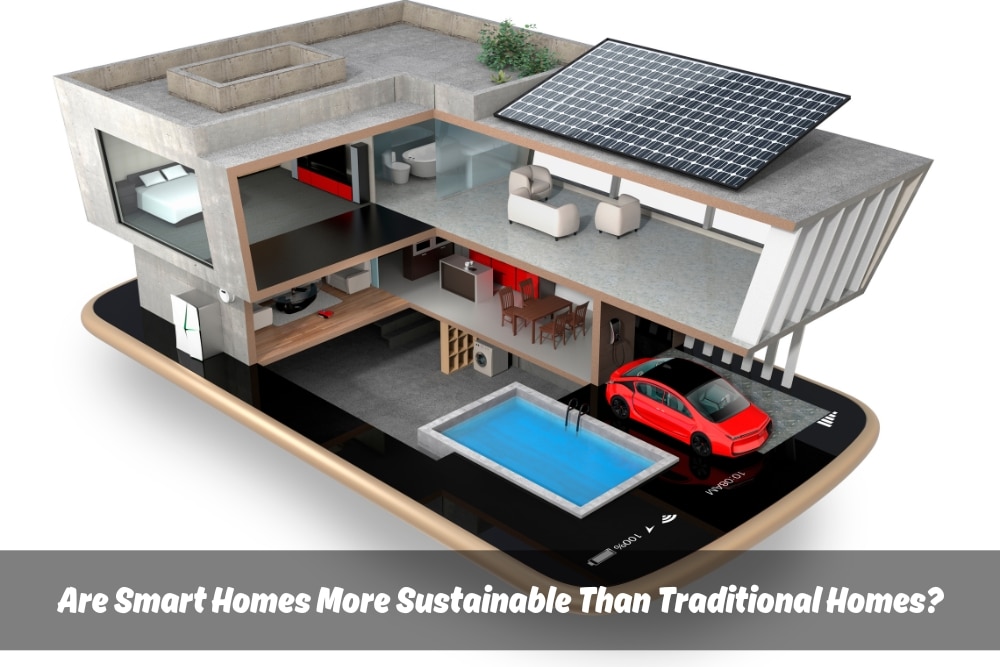Ever imagine a house that acts cool when you leave, texts you if the bath is overflowing (seriously!), and even bugs you to turn off lights you forgot? This ain’t some dream house from a movie; it’s the reality of smart homes. But are these fancy, tech-filled abodes, with all the benefits of smart homes, really better for the environment than regular homes? This guide will tackle how smart homes affect the planet.
Can smart homes reduce energy consumption?
Smart homes aren’t just fancy toys; they can be your secret weapon against energy waste! Here’s how some key gadgets can seriously cut your energy use:
- Smart thermostats: Ever walk into a fridge after work because you forgot to turn down the heat? Smart thermostats are here to rescue you! These brainy devices learn your routine and adjust the temperature automatically. So you can come home to a cozy place without the heat acting like a runaway train all day. Imagine the joy of setting the perfect temperature from work, knowing your house will be toasty by the time you walk in.
- Smart lights: Have you ever left lights on in empty rooms like a total goof? Smart lights are here to banish that phantom energy drain. Control them from anywhere with your phone or voice assistant – no more midnight stumbles in the dark! Even better, set schedules so they turn on and off automatically, just like your usual routine. Plus, you can pair them with motion sensors. These nifty gadgets detect movement and only turn on lights when someone’s there, so no more wasting energy on empty rooms.

- Smart appliances: Smart appliances take convenience and saving energy to a new level. Imagine starting laundry at night when electricity rates are lower, all from your phone. Or preheating the oven while you’re stuck in traffic, so it’s ready to use the second you walk in. But these gadgets are more than just convenient – many are designed to be energy-efficient champs. They can be energy misers while still getting the job done. Plus, some can even predict breakdowns before they happen, saving you the hassle (and cost) of repairs down the line. This proactive maintenance keeps your appliances running smoothly for longer, saving you money in the long run!
Do smart homes help manage water usage?
Saving water is another area where smart homes shine. Check out these possibilities:
- Leak detectors: Ever come back to a flooded bathroom because you forgot about the faucet? Leak detectors are like tiny plumbers, catching those pesky drips before they turn into a nightmare (and a huge water bill, yikes!).
- Smart sprinklers: Everyone’s been there – forget the sprinklers are on and accidentally water the lawn during a downpour. Enter smart sprinklers, your new lawn-watering hero! These awesome hoses are like weather wizards for your lawn. They use the forecast and how thirsty your grass is to water exactly what it needs, keeping your yard lush without wasting a single drop.
- Smart showerheads and faucets: Saving water is easier than you think! These neat gadgets help you use less without feeling like you’re in a shower race or stuck rinsing dishes forever. Win-win for the planet and your wallet!
Beyond energy and water: Additional sustainability benefits of smart homes
The benefits of smart homes go beyond just saving energy and water:
- Eyes on your home, from anywhere! Smart home systems let you see what’s going on, even when you’re out, offering a secure feeling and peace of mind. No more wondering if you left the straightener on, which could save you unnecessary trips and that whole car-emission thing.

- Paperless power! Toss those to-do list scraps and overflowing calendars. Smart assistants and digital dashboards can handle it all, from grocery lists to recipes, saving trees and keeping you organized.
- Breathe easy, for real! Smart air quality monitors are like tiny air detectives, sniffing out pollutants in your home. This way you can take steps to clean things up and maybe even ditch the air purifier some of the time.
Considering the downside: Potential environmental impact of smart homes
While smart homes have a lot going for them in terms of sustainability, it’s important to consider some potential drawbacks:
- E-waste: Smart devices eventually stop working, and throwing them away adds to the growing problem of electronic waste. Choosing long-lasting devices and recycling responsibly is key.
- Think green when you buy: All this fancy smart home stuff takes resources to make. Do a quick search to see which companies are eco-conscious – good for your home, good for the planet!
- Smart devices gotta be smart about energy too: Sure, these gadgets help you save energy on other things, but they use some themselves. Look for models that are energy efficient – kind to your wallet and the environment!
Making smart homes sustainable: User habits and long-term impact
The real key to a green smart home is how you use it. Here’s how to make your tech super eco-friendly:
- Don’t be a gadget hoarder: Shiny new smart stuff is tempting, but hold off on buying everything! Get what you actually need and will use it all the time.
- Energy efficiency first: Look for devices with high energy efficiency ratings to minimize their overall energy consumption.
- Be an eco-conscious user: Smart homes can help you develop sustainable habits, but you gotta be actively involved. Set smart schedules, use remote monitoring to spot potential problems early, and make informed choices about energy use.
Final thoughts
The bottom line is smart homes can totally change how you live! But to keep things eco-friendly, you gotta use this tech wisely. By focusing on what’s good for both us and the planet, you can create homes that are comfy, convenient, and awesome for the environment. Basically, use your smart homes wisely, and you can get all the benefits without hurting the Earth.
Want a greener home?
Yakka Electrical Services is here to help! Our awesome team can guide you through picking the perfect smart gadgets for your place, make sure everything gets installed smoothly, and answer any questions you throw their way. Want a smarter, greener home? Contact us today for a free consultation – it’s the first step to a home that’s good for you and the planet!


